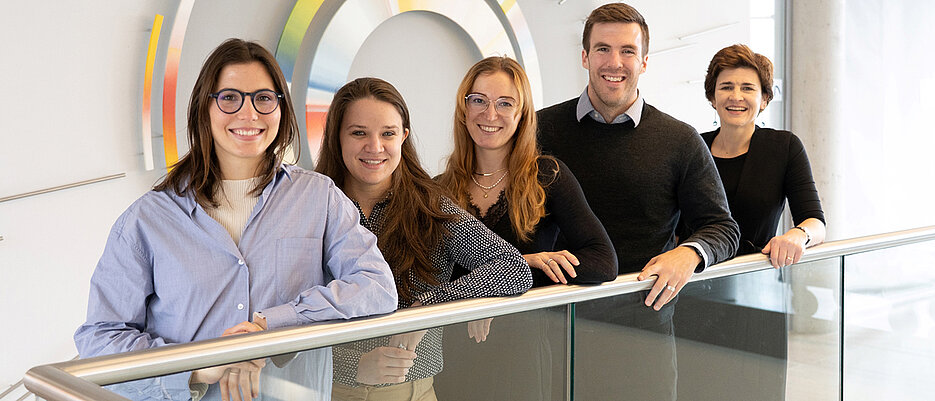Focus on New Approaches to Cancer Diagnosis and Prevention
11/04/2025In an initiative, 25 European countries are working together on new strategies for cancer prevention. The University Hospital of Würzburg is involved with innovative approaches in diagnostics and telemedical counselling.

"We need to move away from reparative medicine towards health maintenance." With these words, Bavaria's Minister of Health and Prevention, Judith Gerlach, presented the State Ministry of Health, Care and Prevention's Master Plan Präventation on 1 October 2025. 250 specific measures were set out in the masterplan - from free, low-threshold sports programmes throughout the state to improving the quality of school meals and new preventative healthcare options. Prevention is also a top priority at Würzburg University Hospital (UKW).
It recently became an official co-operation partner of the European Joint Action "Prevent Non-Communicable Diseases" (PreventNCD). In this initiative, 25 European countries are working together to develop new prevention strategies and surveillance systems for non-communicable diseases - with a particular focus on cancer. The aim of PreventNCD is to identify early risk factors and establish personalised, preventive care that leads to early diagnosis, better treatment and, ideally, the prevention of cancer.
New Innovative Care Models
"The early identification of genetic risk factors is crucial for the targeted diagnosis of cancer and the improvement of treatment options," explains Professor Anke Katharina Bergmann, project manager at the UKW. Her work focuses on optimising genetic counselling and diagnostics for cancer patients up to the age of 35. Modern digital tools, which use artificial intelligence to analyse patients' medical records, are intended to point out genetic risk factors. If such a risk factor is identified, a targeted referral is made to specialised genetic counsellors.
Involving so-called "genetic counsellors" is an essential part of the project. They are specially trained to support patients in the interpretation of genetic information and to coordinate further steps in genetic counselling, diagnostics and the introduction of preventive measures. "Genetic counsellors are not yet an officially recognised professional group in Germany, but their work is essential to relieve the burden on specialists in human genetics and enable them to concentrate on more complex diagnostic and therapeutic decisions," says Dr. J. Matt McCrary, coordinator of the project.
Telemedicine Approaches for Broader Care
Another aim of the initiative is to use telemedicine to improve access to genetic counselling for patients in rural or remote areas. Telemedical counselling has already proven to be very successful in other projects, such as the OnkoRisk-NET project. "In OnkoRisk-NET, nine out of ten patients took advantage of a telemedical consultation, while only 30 to 40 per cent of patients who were given a traditional telephone number of a human geneticist attended the appointment," explains Bergmann. She and McCrary are also already working on the implementation of telemedical approaches in genetic counselling in the EU project CAN.HEAL.
The aim of the studies and analyses is to reduce administrative bottlenecks, create standardised processes and develop genetic counselling that is accessible to all patients in Europe. "Through interdisciplinary collaboration, we not only want to improve genetic diagnostics and counselling, but also develop effective prevention strategies that can be implemented across Europe," says Bergmann.
Early Detection of Genetic Susceptibility for Better Cancer Prevention
Around ten per cent of all cancers are genetic. Mutations that increase the risk of breast and ovarian cancer are particularly well known. However, other genetic susceptibilities, such as Li-Fraumeni syndrome or childhood tumours, also require early identification. Bergmann emphasises that although progress has already been made in many areas of early genetic diagnosis, a great deal of educational work is still needed to exploit the full potential of genetic diagnostics.
Another important component of PreventNCD is the training of doctors and medical staff in genetic screening. "We need to raise awareness of the relevance of genetic diagnostics in clinics and practices and make doctors less shy about genetic testing," explains Bergmann. In particular, the Genetic Diagnostics Act in Germany, which stipulates strict regulatory requirements for genetic tests, often causes uncertainty among doctors. However, genetic tests for diseases with a proven or suspected genetic component are not only permitted, but are expressly provided for in many S3 guidelines.
By participating in the EU PreventNCD initiative, the UKW aims to take cancer prevention and treatment to a new level. "Our aim is to identify patients with a genetic predisposition at an early stage, diagnose the causes and derive specific measures for improved treatment and aftercare," concludes the professor.
Further Information
With the Prevention Masterplan, which replaces the Bavarian Prevention Plan from 2015, the Bavarian State Ministry of Health, Care and Prevention is joining forces to increase health awareness, health promotion, prevention and early detection in Bavaria. So that everyone can find their own personal "Prevention Masterplan".
On the subject of tumour predisposition, there is a new consultation hour at the UKW in the Comprehensive Cancer Center Mainfranken between Oncology (Dr. Barbara Deschler-Baier), Human Genetics (Professor Anke Katharina Bergmann) and Paediatrics (Professor Matthias Eyrich).
Details on Professor Anke Katharina Bergmann can be found in the press release on the occasion of her appointment to the Professorship of Clinical Genetics and Genomedicine at the Faculty of Medicine of the University of Würzburg.
Details on the new Institute of Clinical Genetics and Genomedicine can be found in the press release dated 30 September 2025.








